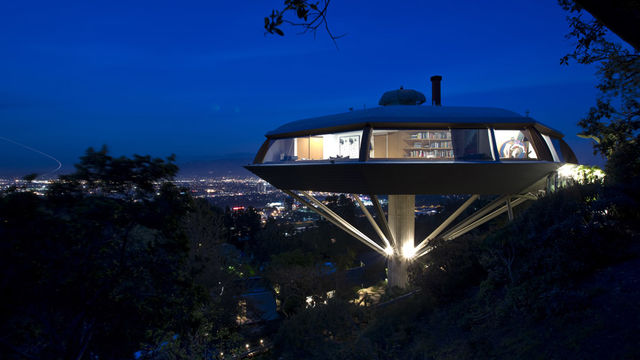
Panel Discussion: Building Character, Modernist Architecture in Film
- This is a past program
A distinguished panel discusses high profile modernist monuments that ultimately become protagonists when used as locations in feature films. Highlighted architecture will include John Lautner's Chemosphere, which played a starring role in Body Double, Richard Neutra's Lovell House, featured in L.A. Confidential, Adalberto Libera’s Casa Malaparte in Godard’s Contempt, and the Marin County Civic Center which was designed by Frank Lloyd Wright and is a central location in GATTACA.
Edward Dimendberg is associate professor of Film and Media Studies, Visual Studies, and German at the University of California, Irvine, and author of Film Noir and the Spaces of Modernity. He is currently completing a book on the architecture of Diller Scofidio + Renfro as a University of California President's Fellow in the Humanities.
Anne Friedberg is professor and chair of Critical Studies at USC’s School of Cinematic Arts, and is a historian and theorist of modern media culture. Her books include: Window Shopping: Cinema and the Postmodern, Close Up 1927-1933: Cinema and Modernism, and The Virtual Window: From Alberti to Microsoft.
Barbara Lamprecht, M.Arch., and senior architectural historian at ICF – Jones & Stokes, specializes in Early and Mid-Century Modernism and is the author of Richard Neutra – Complete Works and Neutra – Selected Projects.
Jon Yoder is assistant professor in the Syracuse University School of Architecture and a Ph.D. candidate in the UCLA Department of Architecture and Urban Design. His doctoral dissertation, “Widescreen Architecture: The Immersive Visuality of John Lautner,” takes Lautner’s ocular-centric projects as lenses through which to focus on issues of experiential and projective vision.
Co-presented by the UCLA Department of Architecture and Urban Design.
ALL HAMMER PUBLIC PROGRAMS ARE FREE
Public programs are made possible, in part, by major gifts from the Annenberg Foundation, and Ann and Jerry Moss. Additional support is provided by Laura Donnelley, Bronya and Andrew Galef, an anonymous donor, and the Hammer Programs Committee.







